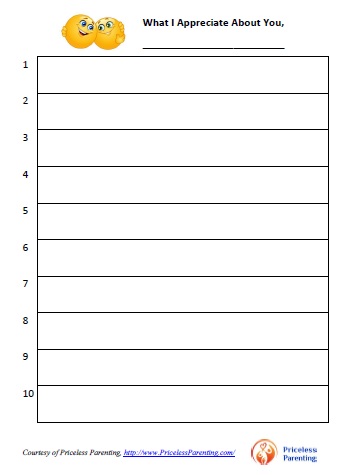What four things matter the most in parenting? Might they be the same as the four things that matter most in life? It’s likely since your relationships with your children are among the most significant ones in your life.
The Four Things That Matter Most
Dr. Ira Byock, an international leader in palliative care, has witnessed many people’s final days. He’s captured the valuable things he’s learned from the dying in his book, The Four Things That Matter Most: A Book About Living.
Byock noticed many who are dying have a strong desire to repair relationship rifts with their loved ones. Repairing their relationships allows them to die in a more peaceful state. He learned that these four statements were the crucial ones to communicate:
(finish reading at PricelessParenting.com)
Evaluating Risks and Heeding Warnings
Taking risks is part of living. Your kids need to be able to take reasonable risks to learn and grow. For example, your children would never learn to walk if they weren’t able to risk falling.
Since you can’t keep your kids in some sort of safety bubble, what can you do to help prevent them from being hurt? You can help them think through likely consequences of their choices.
By forewarning your kids, you prepare them. When they are young, you warn them about everything from not touching a hot stove to never getting in a car with a stranger. When they are older you warn them about not drinking and driving. You love them and are trying to protect them from danger. However, it’s up to them to decide if they will heed your warnings.
Giving Warnings
Your kids will sometimes ignore your warnings and learn from the results. They might not hold on tightly to their helium balloon and it sails away. Perhaps they decide to play video games instead of study for a test and get a poor grade. These are natural consequences of their choices. They learn from experiencing these consequences … although some kids will need lots of examples!
How about when the consequences are bigger? Regular conversations involving true stories can help. Your local newspaper is an excellent source of stories about kids facing serious consequences.
(finish reading at PricelessParenting.com)
Since you can’t keep your kids in some sort of safety bubble, what can you do to help prevent them from being hurt? You can help them think through likely consequences of their choices.
By forewarning your kids, you prepare them. When they are young, you warn them about everything from not touching a hot stove to never getting in a car with a stranger. When they are older you warn them about not drinking and driving. You love them and are trying to protect them from danger. However, it’s up to them to decide if they will heed your warnings.
Giving Warnings
Your kids will sometimes ignore your warnings and learn from the results. They might not hold on tightly to their helium balloon and it sails away. Perhaps they decide to play video games instead of study for a test and get a poor grade. These are natural consequences of their choices. They learn from experiencing these consequences … although some kids will need lots of examples!
How about when the consequences are bigger? Regular conversations involving true stories can help. Your local newspaper is an excellent source of stories about kids facing serious consequences.
(finish reading at PricelessParenting.com)
Subscribe to:
Posts (Atom)
Are your kids being targeted for sextortion?
Scammers are targeting kids for sextortion. They convince kids that nude pictures of them will be distributed to family, friends, classmate...

-
The word 'yet' can be incredibly powerful. If your child says, "I can't do this," add the word 'yet' to the en...
-
What is your normal parenting style? Do you give your kids orders? Do you do a lot of things for them that they are capable of doing thems...
-
Susán Hoemke dreamt of a perfect family - a loving husband and four beautiful children. When their oldest son, Hayden, became addicted...



